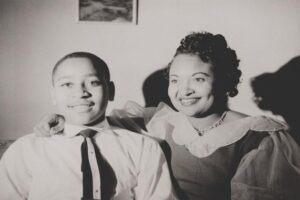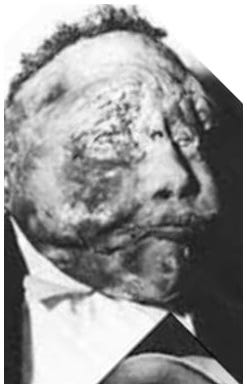This past weekend I finally had the opportunity to watch the movie “Till.” If you choose to watch it, let this be a warning. You won’t be the same by the time the credits roll.
For those of you who are unfamiliar with Emmett’s story, let me give you the background.
Emmett “Bo” Till was born on July 25, 1941. He was the only child of Mamie Bradley. Bo’s father died in World War II. Mamie was exceptionally bright and worked as a civilian clerk at the U.S. Air Force. She was also a good mother and did her best to protect Bo from the ugliness of racism.
At 14 years old, Bo was a typical teenage boy. He had a sunny disposition and was often joking and laughing. He enjoyed dancing and singing around his home, and he was considered to be a sharp dresser

Mamie was understandably concerned when Bo wanted to visit his relatives in Mississippi. She knew how Blacks were treated in the Deep South, and she didn’t want Bo exposed to the hatred of white people.
She finally relented and gave Bo permission, along with several warnings on how he was to act. Bo told her not to worry and that he would behave himself. And, on a warm August day, Mamie put her son on the train with a promise that she would see him soon.
Unfortunately, Bo did not truly understand how deep the racial divide was in Mississippi.
Bo spent his first few days working with his cousins in the cotton fields and spending time on the front porch of their shack in the evenings. The day the boys decided to stop by Bryant’s Grocery and Meat Market to buy some soda and treats and watch a game of checkers on the front porch.
We don’t know precisely what happened inside the store on August 24, 1955. The story has changed several times over the years. Carolyn Bryant, a very attractive woman, was working that day. Bo was probably telling her jokes and trying to impress her and his cousins. He didn’t realize that he was committing a crime in those days of Jim Crow laws and segregation. His cousins pulled him out of there, but it was too late. The damage was done.
When Carolyn’s husband, Roy, returned home a few days later, she informed him of what had happened. Roy and his brother-in-law, J.W. Milam, went to the house of Mose Wright, Bo’s great-uncle, and took Bo from the house shortly after midnight on August 28.
Bo’s body was found three days later in the Tallahatchie River. Roy and J.W. had beaten him beyond all recognition, gouged out his eyes, shot him in the head, and bound his body to a 75-pound cotton gin fan with barbed wire.
This is what Mississippi sent back to Mamie Bradley:

Close your eyes for a moment and imagine this was your child. Try to imagine the grief that Mamie felt, knowing the pain and fear that her child suffered.
This is what hate did to her son.
And she wanted the world to see. The funeral was open-casket, and probably for the first time, the nation’s eyes were opened to what was happening in the South.
I’m sure I don’t need to tell you that an all-white male jury found Roy and J.W. not guilty. One year later, the two men gave an interview to Life magazine and admitted to the murder.
Are you disgusted as I am?
Though grieving, Mamie channeled her pain to advocate for change.
Three months after Bo’s death, on December 1, 1955, Rosa Parks was arrested for refusing to give up her seat on a bus. That was followed by a boycott of the Montgomery bus system that lasted over a year.
On August 28, 1963, exactly eight years after the death of Emmett “Bo” Till, Dr. Martin Luther King, Jr. stood on the steps of the Lincoln Memorial and spoke those famous words, “I have a dream.”
That brings us to 2006 when the FBI started the “Cold Case Initiative”. Its purpose was to review murders that took place before December 31, 1979, and identify those that were racially motivated. The Emmett Till Unsolved Civil Crimes Act of 2007 and its reauthorization in 2016 expanded the responsibilities of the DOH and FBI for investigating and persecuting hate crimes.
Finally, after 200 attempts to outlaw lynching, the Emmett Till Antilynching Act was passed in February 2022 and made lynching a federal hate crime.
Mamie never had more children and passed away on January 6, 2003. She’s now reunited with her son, whom she lost to senseless violence almost 50 years ago.
Even though it is no consolation for what she lost, she can be proud of what she accomplished. But I think she would agree…
We have a long ways to go.
